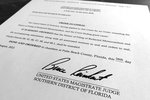


WASHINGTON (AP) — Fourteen of the 15 boxes recovered from former President Donald Trump's Florida estate earlier this year contained documents with classification markings, according to an FBI affidavit released Friday explaining the justification for the search of the property this month.
The 32-page affidavit, even in its redacted form, contains additional details about an ongoing criminal investigation into Trump just as he lays the groundwork for another presidential run. It underscores the volume of sensitive government documents located at Mar-a-Lago and reveals FBI concerns that the records were being retained illegally.
Though the document offers the most substantial description of the investigation, federal officials also redacted significant portions of it to protect the identity of witnesses and to avoid revealing sensitive investigative tactics.
The FBI submitted the affidavit, or sworn statement, to a judge so it could obtain a warrant to search Trump's property. Affidavits typically contain vital information about an investigation, with agents spelling out the justification for why they want to search a particular property and why they believe they’re likely to find evidence of a potential crime there. But affidavits routinely remain sealed during pending investigations, making the judge’s decision to reveal portions of it all the more striking.
In an acknowledgment of the extraordinary public interest in the investigation, U.S. Magistrate Judge Bruce Reinhart on Thursday ordered the department by Friday to make public a redacted version of the affidavit. The directive came hours after federal law enforcement officials submitted under seal the portions of the affidavit that they want to keep secret as their investigation moves forward.
Documents previously made public show that federal agents are investigating potential violations of three federal laws, including one that governs gathering, transmitting or losing defense information under the Espionage Act. The other statutes address the concealment, mutilation or removal of records and the destruction, alteration or falsification of records in federal investigations.
In his order Thursday, Reinhart said the department had made compelling arguments to leave sealed broad swaths of the document that, if disclosed, would reveal grand jury information; the identities of witnesses and “uncharged parties"; and details about the investigation's “strategy, direction, scope, sources and methods.”
But he also said he was satisfied “that the Government has met its burden of showing that its proposed redactions are narrowly tailored to serve the Government’s legitimate interest in the integrity of the ongoing investigation and are the least onerous alternative to sealing the entire Affidavit.”